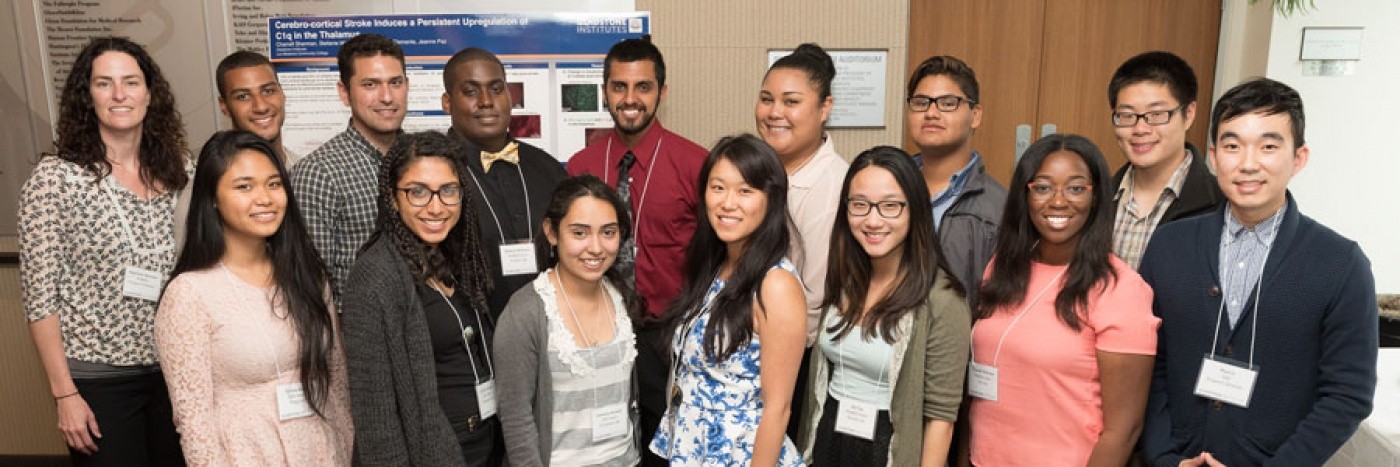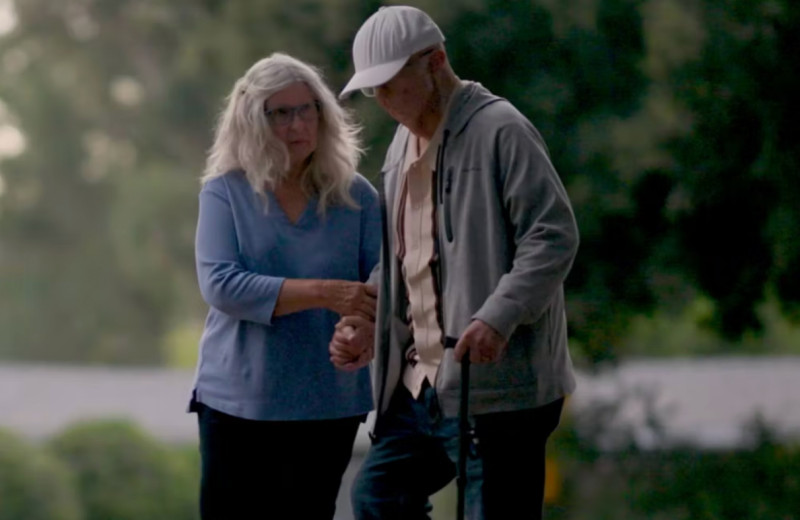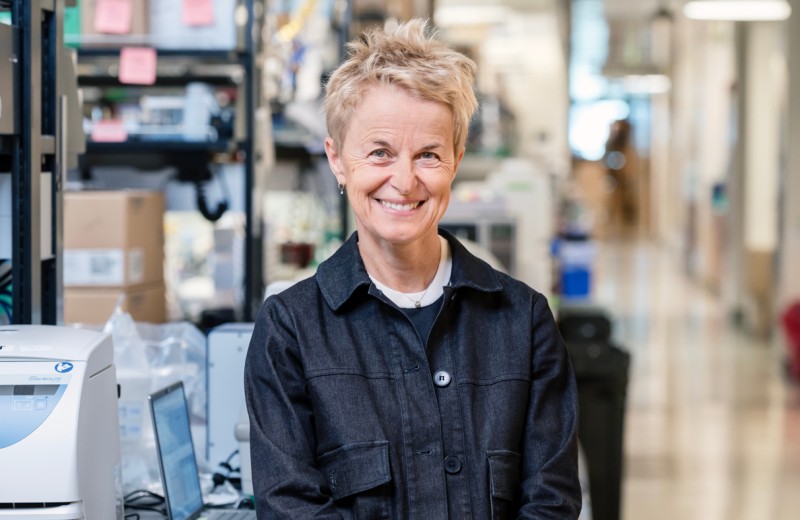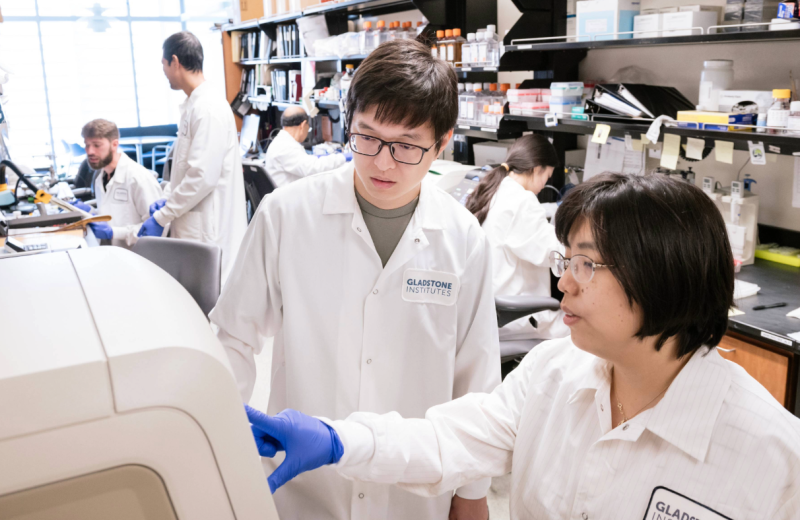Gladstone NOW: The Campaign Join Us on the Journey✕

Gladstone's diversity interns shared their scientific discoveries at an institute-wide poster session led by program leaders Shannon Noon (far left) and Paul Li (far right).
Gladstone recently held its annual Diversity Interns Poster session. This event celebrated the research accomplishments of under-represented high school and undergraduate students who spent their summer working in labs at Gladstone, fueling their passion for a future career in biomedical research.
Thirteen diversity interns arrived at Gladstone in June to begin their summer journey in scientific discovery. These interns were from two programs: Promoting Underrepresented Minorities Advancing in the Sciences (PUMAS) and Gladstone Summer Scholars (GSS). In these programs, the interns work directly with a scientific mentor doing hands-on biomedical research in a laboratory at Gladstone. They also meet regularly with their mentors, lab mates, and fellow interns to learn first-hand what life is like working in academic biomedical research.
The PUMAS program was established in 2014 by Melanie Ott, a senior investigator at Gladstone and professor of medicine at the University of California, San Francisco. It is funded by the National Institute of Health, through an education grant that supports educational activities that enhance the diversity of the biomedical, behavioral, and clinical research workforce. The PUMAS program supports community college students who plan to transfer to a four-year institution to pursue a bachelor’s degree in science, technology, engineering, or mathematics (STEM).
The GSS program began in 2008 and is sponsored by Gladstone. This program supports rising seniors from a public high school within San Francisco who have an interest in pursuing careers in science.
Over the summer, the diversity interns gained more than just experience working in a lab. They also participated in a series of workshops organized by Shannon Noonan, the education and community partnerships manager at Gladstone, and led by both current scientists and alumni of Gladstone. These workshops covered a variety of topics, such as how to get a great letter of recommendation, what life is like as a graduate student, how to communicate scientific research, and how to use computer programming in biomedical research. The interns also learned some tips on how to apply to medical school from Valerie Margol, associate director of the Office of Outreach & Academic Advancement at the University of California, San Francisco (UCSF) School of Medicine.
“We are grateful for everyone who volunteered their time to speak with our summer interns,” said Noonan. “The fact that so many of the volunteers trained at Gladstone reminds us of how much our graduate students and postdocs value their training experience here.”
At the end of the summer, interns from both programs presented their scientific discoveries during an institute-wide poster session. The event was well attended by the Gladstone community, UCSF, and the general public.
“We are so proud of the work these bright, budding scientists do over the summer,” said Sandy Williams, president of Gladstone, who visited each interns’ poster during the event. “We are honored to be an important part of helping them find their dream careers.”
Two of the GSS interns also presented their research findings at Creativity Award Day, an event hosted by the California Institute for Regenerative Medicine (CIRM), and won the award for Best Video, a parody of Taylor Swift’s “Blank Space,” entitled, “Stem Cells & Summer.” Both students were sponsored by CIRM, who, every year, supports two GSS interns who spend their summer doing stem cell research. One of the interns, Vanessa Arreola, also received an award for Best Student Presenter, which marks the third consecutive year that a Gladstone intern has won the award.
“I am delighted that one of our interns has won this award again,” said Paul Li, science education specialist at Gladstone, who coached Arreola before her presentation. “I am so proud of the accomplishments our interns make in such a short amount of time.”
“These summer programs not only support the interns, but they also give our postdocs and graduate students essential experience in leadership and mentoring,” said Michael Penn, vice president of diversity, outreach, and mentoring at Gladstone. “This is just one example of how Gladstone continues to be one of the premier places for postdocs and graduate students to train.”
Participants
PUMAS interns and mentors: Amir Majlessi (mentored by Jeff Johnson and Billy Newton, Krogan lab), Nik Mendoza-Camacho (mentored by Yun Wang, McDevitt lab), Leonida Radford (mentored by Katreya Lovrenert, Stem Cell Core), Desmond Richmond-Buccola (mentored by Emilie Battivelli and Emilie Besnard, Verdin lab), Charrell Sherman (mentored by Alexandra Clemente and Stefani Makinson, Paz lab), Kit Tse (mentored by Patrick Bradley and Josh Ladau, Pollard lab), Damon Williams (mentored by Juan Perez-Bermejo, Conklin lab), and Amy Wong (mentored by Daniela Boehm, Ott lab).
GSS interns and mentors: Vanessa Arreola (mentored by Casey Gifford, Srivastava lab), Christopher Ma (mentored by Xu Chen and Tara Tracy, Gan lab), Comie Sotio (mentored by Ke Li, Xiaojing Wang, and Yu Zhan, Ding lab), and Joshua Urrutia (mentored by Isabelle King, Srivastava lab). Additional mentors include Jeannette Osterloh from the Finkbeiner lab.
Workshop volunteers: Dorothee Vogt Alatorre (Medivation, alumni of Ott lab), Jessie Butts (McDevitt lab), Kim Baeten (University of California, Berkeley, alumni of Akassoglou lab), Leonard Chavez (Blood Systems Research Institute, alumni of Verdin lab), Emily Jones (Huang lab), Luke Judge (Conklin lab), Irfan Kathiriya (Bruneau lab), Issy King (Srivastava lab), Laura Leung (Circuit Therapeutics, alumni of Huang lab), Bryce Mendelsohn (Nakamura lab), John Newman (Verdin lab), Ethan Radzinsky (Srivastava lab), and Faten Sayed (Gan lab).
One Person’s Final Gift to Science Gets Us Closer to an HIV Cure
One Person’s Final Gift to Science Gets Us Closer to an HIV Cure
A new documentary follows Jim Dunn’s end-of-life decision to donate his tissues to HIV research.
Institutional News HIV/AIDS Infectious Disease Roan LabBeyond Viruses: Expanding the Fight Against Infectious Diseases
Beyond Viruses: Expanding the Fight Against Infectious Diseases
The newly renamed Gladstone Infectious Disease Institute broadens its mission to address global health threats ranging from antibiotic resistance to infections that cause chronic diseases.
Institutional News News Release Cancer COVID-19 Hepatitis C HIV/AIDS Zika Virus Infectious DiseaseFueling Discovery at the Frontiers of Neuroscience: The NOMIS-Gladstone Fellowship Program
Fueling Discovery at the Frontiers of Neuroscience: The NOMIS-Gladstone Fellowship Program
The NOMIS-Gladstone Fellowship Program empowers early-career scientists to push the boundaries of neuroscience and unlock the brain’s deepest mysteries.
Institutional News Neurological Disease Mucke Lab NOMIS



